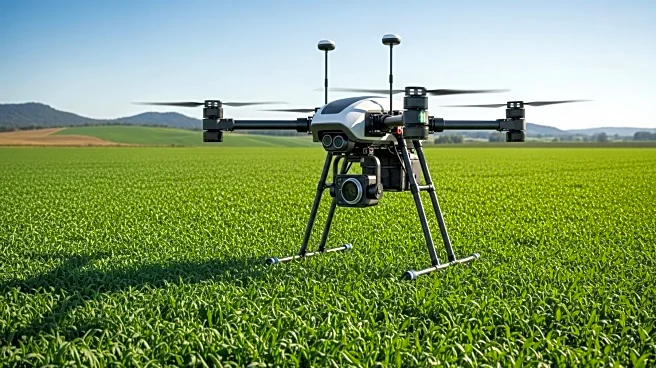What's Happening?
Folio3 AgTech is revolutionizing the agricultural sector by integrating artificial intelligence (AI) into farming practices. The company provides AI-driven tools that offer predictive insights and automated solutions to improve efficiency across various farming operations. These tools help farmers manage unpredictable factors such as weather, pests, and market fluctuations, which traditionally relied on personal experience and seasonal history. Folio3 AgTech's platforms enable precision in crop management, livestock monitoring, and supply chain operations, thereby reducing costs and maximizing yields. The AI systems can detect early signs of crop diseases, optimize feed mixes for livestock, and forecast inventory needs, ensuring that farmers can make informed decisions to enhance productivity and sustainability.
Why It's Important?
The introduction of AI in agriculture is significant as it addresses several challenges faced by farmers, including rising input costs, labor shortages, and the demand for sustainable food production. By leveraging AI, farmers can achieve greater control over their operations, reduce waste, and increase profitability. The technology supports eco-friendly practices, which are increasingly important to consumers and can lead to certifications that enhance market trust. Folio3 AgTech's solutions offer measurable benefits, such as reduced pesticide costs and improved animal health, which contribute to the overall sustainability and economic viability of farming operations. This shift towards AI-driven agriculture is crucial for adapting to changing environmental and market conditions.
What's Next?
As AI becomes more integrated into farming, Folio3 AgTech plans to expand its offerings to support direct-to-consumer sales and digital platform integration. This will allow farmers to manage logistics, compliance, and customer orders more efficiently. The company aims to create a connected ecosystem that supports seamless data flow across all farming operations, enhancing decision-making and adaptability to market demands. The future of farming is expected to be increasingly reliant on smart, connected, and sustainable practices, with AI playing a central role in this transformation.
Beyond the Headlines
The adoption of AI in agriculture not only improves operational efficiency but also has broader implications for food security and environmental sustainability. By optimizing resource use and reducing chemical reliance, AI-driven farming can contribute to healthier ecosystems and more resilient food systems. Additionally, the technology empowers farmers to meet consumer expectations for traceable and safe food products, potentially reshaping market dynamics and consumer trust in agricultural practices.








